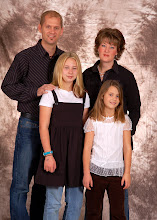Small Groups structure. Frankly, this is something that I struggled with in the local church. How do you get all of your groups to buy in to the vision, mission and structure of your small group ministry? What do you do with renegade groups? What do you do with stubborn groups? What do you do with groups who were meeting "long before you came here, blah, blah, blah" and "we're not about to change now..."?
The model @ Fellowship is "this is our structure and if you don't fit or don't want to fit you will not be a part of our home team ministry". Structure allows you to have quality control. It also allows you to know WHO is leading the group, WHAT are they studying, WHEN do they meet, WHY do they meet, WHO attends, HOW do people join, WHERE is the group heading, and so on.
What do you think of structure? Do your groups resist it?
Wednesday, February 1
Subscribe to:
Post Comments (Atom)

3 comments:
Structure....
Is Good! People need to have a level of comfort with what is going on. With our ministry groups, there are specified days, places, and times always listed and advertised on a regular basis.
Our topic may change, but our group has built bonds with each other and have traveled with us whatever we talk about.
Our church is approx. 550-600 in Sunday AM attendance. We have 9 small groups that range from 3-25 ea. We have found that in our area, groups that are based upon your life situation have worked. A few of our groups are affinity groups. (For example: we have a men's small group, children's workers small group, weight loss--putting God first group, an adult 18-62 group and even some groups based around prayer or a particular type of study. This range of groups has given options to people.
I feel that small groups are crucial especially to a church over 100 people. At 350, it was difficult to know everyone, and now at 550-600 there are people that I have been going to church with for a year or so, whose name I don't know.
How does a church like this exist? Structure and planning. We planned that all would have an opportunity to be in a small group, where you do know everyone's name and you start to get into their lives, and have them as prayer or accountability partners.
Our groups near 25 in attendance are beginning to break into 2 small groups. The idea is to keep it small enough where everyone can share their opinion and learn.
We have not had our first group break in two yet, so the success of that is yet to be determined.
My wife and I are co-teachers of an adult small group 18-62 call Gap groups...the gap between high school and senior citizens.
Our structure is to meet from 5-6:40 for volleyball,fellowship, and food. (If you feed them they will come.) Then our group is from 7-8:30. We have just added volleyball before and after the meeting. Sports is a big draw for young adults. I like the mix of ages because we can draw from each others wisdom and life experiences. We set ground rules like: No question is a dumb question, If we don't know the answer we'll find the answer, be informal, and we offer childcare for our group. It has grown from 5-30 people involved with an average attendance of 20. We are the 2nd and 4th Fri of every month. I use e-mail, postcards, text messaging, and now our blogspot to update and connect with my people. We are considering splitting our group in 2 months.
The main thing is to look at your target audience for your group, see what their needs are (spiritual, emotional, and situational needs are.) Is your group friendly to new Christians or is it for the seasoned Christians who are now ready for the "meat of the word?" Do you people have a chance to eat before they come or do you need to adjust the times or offer snacks? Are you targeting people who need to get childcare everytime they come or should you offer childcare, or does it not apply? Do you include several ways of learning information like video clips, music, hands-on, discussion? Once you find out... make your "ground rules" known. Set your times and dates so that they are close enough, but not too close together.
Whew! Lots to think about, but it works! Pray Pray Pray! God will bless your efforts.
Thanks for reading.
In His Grip,
Ben Sorrells
Administrative Assistant
Stand in the Gap - Co-Coordinator
P.S. Our small groups are generally called LIFT groups
L = Leadership
I= Intercession
F= Fellowship
T= Training
Some our LIFT groups have come up with names of their own... Gap Groups and the HUDDLE.
Cont'd from
Ben Sorrells
Administrative Assistant
Stand in the Gap Co-Coordinator
Hey Tim---
I've lurked on your site a bit these past few months...this particular post was spot-on what I've been thinking about lately. I'm in a church of about 200 and am responsible for laying the foundation of our groups ministry. I have found myself turning to the usual resources (North Point Community, Willow Creek, Saddleback) as well as others that I've come across online as I scour for ideas. I have no intention of re-inventing the wheel here. But I know that over time we'll make it our own and figure out what works here in Rapid City.
Pray for us as we ramp up our groups ministry in the coming months.
Post a Comment